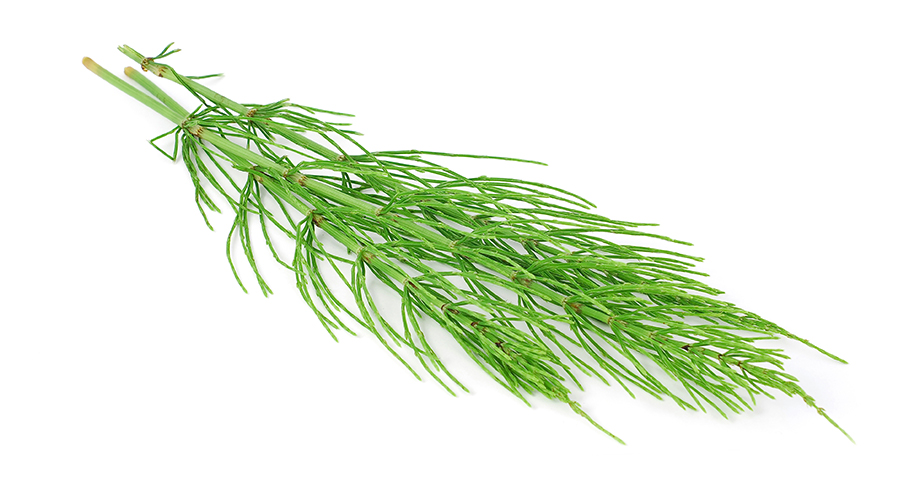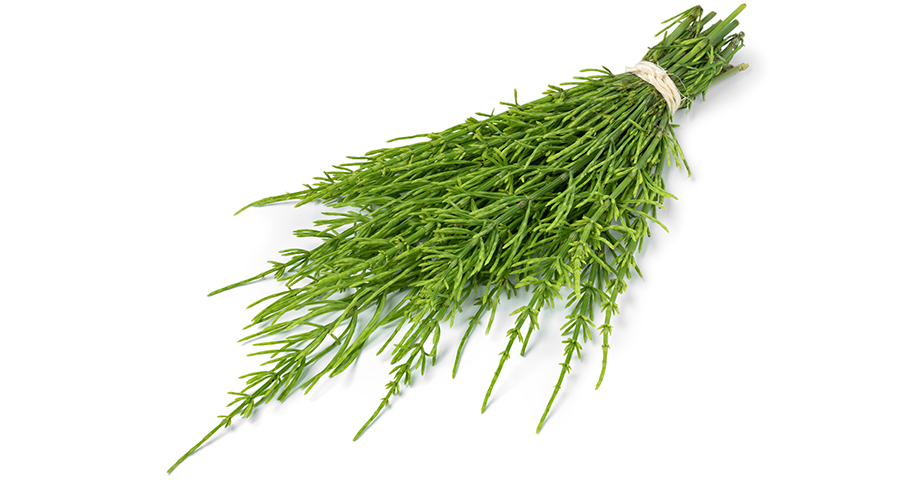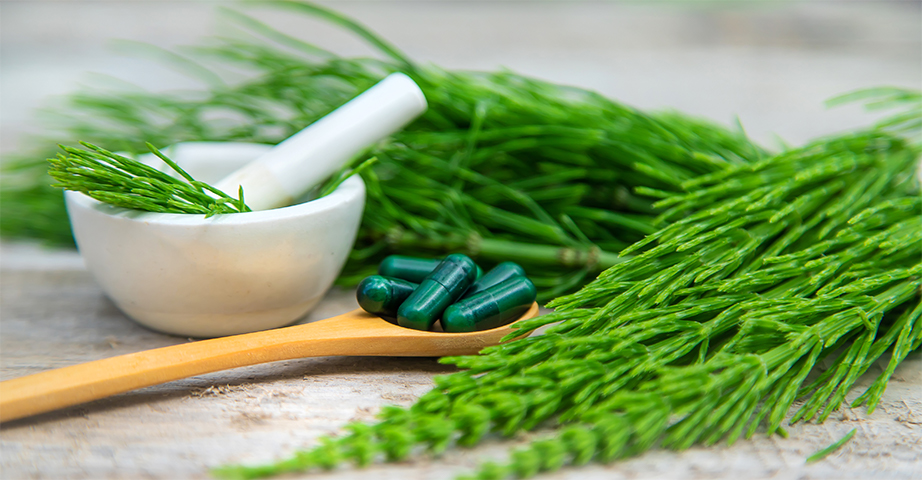Horsetail - more than just help for your hair and nails

Horsetail is best known for its hair strengthening properties. It is found in most hair, skin and nail supplements. However, this plant, typical for colder areas of Europe, has many other health-promoting properties. Does field horsetail really help hair? What are its properties? For whom can field horsetail be dangerous?
Horsetail - overview
Horsetail (Equisetum arvense) is a long-living plant belonging to the fern family. It grows naturally in the northern part of Europe and North America, as well as in other humid areas with a temperate climate. Field horsetail is very common in the lowlands. What does it look like? Between March and May, it appears as a single, brown stalk, ending in a spike containing spores. Once the spores wither, the shoots appear. Then the field horsetail looks completely different. It has a long, green and densely branched stem that grows until autumn and reaches a height of up to 40 cm. The leaves of the plant can be compared to fir branches, but they are all green. The horsetail branch looks like a Christmas tree - it is wide at the bottom, narrows towards the top and has a tip. Horsetail is rough to the touch, which is due to the high proportion of silicon in the plant's cell walls.
Horsetail grows at the edges of forests, in wet fields, fallow land and in ditches. The green twigs are collected at the end of June and in July, on dry days, by cutting only the upper, green and healthy parts. Then they have to be dried. Since ancient times, horsetail herb has been extracted in this way to prepare decoctions used in traditional medicine.
Recommended products with horsetail
Horsetail properties
The properties of horsetail have been used in traditional medicine for decades. The raw material is the horsetail herb - the green barren shoots. It is believed to have expectorant, diuretic and anti-haemorrhagic effects as well as improve bone mineralisation and support metabolism. Traditional oral uses of horsetail in the form of herbal decoctions include urinary tract inflammation, urinary tract bleeding, kidney stones, pancreatic disease, lung bleeding, rheumatoid arthritis, obesity and eczema. The decoction compresses applied on the skin are used in traditional medicine for conjunctivitis, hard-to-heal wounds, ulcers, bruises, burns and for washing hair in case of dandruff. In recent decades, horsetail has gained interest as a remedy for weak and falling hair.
Active ingredients of horsetail
Modern science proves that horsetail contains numerous bioactive compounds, which are responsible for its healthy properties. Scientific research also confirms the effectiveness of field horsetail in many applications originating from traditional phytotherapy.
Apart from large amounts of silicon in the form of silica (silicon oxide), which is most demanded by weak hair, skin and nails, field horsetail is a very good source of antioxidants - mainly the glycosides quercetin, kaempferol and apigenin, belonging to the flavonoids category. Moreover, it provides a whole range of vitamins and minerals - vitamin C, E and K, almost the whole vitamin b complex (except vit. B12) as well as potassium, sodium, calcium, magnesium, zinc, iron and copper. Horsetail herb is one of several plant raw materials containing kynurenic acid, which is known to have anti-inflammatory, antioxidant and analgesic properties. This entire set of bioactive components, not just silicon, is responsible for the properties and use of field horsetail.
Horsetail for hair
The effect of field horsetail on hair is attributed to the presence of high amounts of silicon and antioxidants. Antioxidants help to reduce inflammatory microstates and slow down the ageing of hair fibres caused by free radicals. On the other hand, higher silicon content in hair fibres results in lower hair loss. It also makes hair shinier, which indicates an improvement in hair structure.
Most studies on the effect of field horsetail on hair use the self-assessment of the people participating in the analysis as an indicator of efficiency. Therefore, it is difficult to have a clear scientific position on the effectiveness of field horsetail in this aspect. However, based on observations, it can be assumed that field horsetail actually prevents hair loss and improves hair structure. The doses of field horsetail usually used in scientific studies range from 20 to 50 mg of silica (not field horsetail extract!).

Field horsetail - impact on health
Based on modern scientific research, it is known that field horsetail has a protective effect on the liver, bones, is a diuretic, has anti-inflammatory and antibacterial properties (inhibits the growth of many pathogenic bacteria including Staphylococcus aureus, Escherichia coli, Klebsiella pneumoniae, Pseudomonas aeruginosa, Salmonella enteritidis, Aspergillus niger and Candida albicans). What does field horsetail help?
Field horsetail can prevent osteoporosis
Two cell types, osteoblasts and osteoclasts, are mainly responsible for bone metabolism. The first ones have a reconstructive effect on bone cells, while the second ones promote their breakdown. Field horsetail has been shown to inhibit osteoclast activity. It can be helpful in osteoporosis. In this disease, osteoclast activity is increased, resulting in an excessive breakdown of bone cells and bone fragility. The main component of field horsetail, silica, which is also present in bones, improves their formation, density and consistency as well as cartilage tissue by increasing collagen synthesis, improving calcium absorption and utilisation.
Field horsetail accelerates wound healing
Some smaller studies have shown that ointments with horsetail extract accelerate wound healing. Positive effects were achieved, for example, when an extract with 3% field horsetail extract was applied to women after childbirth with a surgical perineal incision. Faster healing of the incision and a reduction of pain were noted in comparison to the control group.
Field horsetail is a safe diuretic
Horsetail extract tablets in a dose of 900 mg per day have a diuretic effect equal to that of conventional drugs. At the same time, no significant changes are observed in the function of the liver, kidneys or in the removal of electrolytes. This is an important finding, as many diuretics cause electrolyte imbalances, which can be dangerous to health.
Field horsetail may help in the treatment of rheumatoid arthritis
Research shows that people with rheumatoid arthritis have lower levels of kynurenic acid in their synovial fluid than people with osteoarthritis. On the other hand, field horsetail is one of the best plant sources of this acid. It has also been shown that horsetail extract has an immunomodulatory effect and reduces inflammatory processes. Researchers suggest that field horsetail may be used as an aid in the treatment of rheumatoid arthritis.

Horsetail tablets
Horsetail tablets are offered by many producers. How to choose the ones that really work? First of all, standardisation is essential. What does it mean? The manufacturer states how much field horsetail extract is contained in one dose and how much silica - the main component of field horsetail - is contained in this extract. It is best if one dose of the supplement is one or two pills. It affects both convenience of use and cost.
Field horsetail in tablets is most commonly purchased for problems with weak hair. According to scientific studies, the daily dose of silica used for hair strengthening is 20-50 mg. This is the dosage that a good field horsetail tablet should contain.
Contraindications to the use of field horsetail
Horsetail taken orally over a long period of time can be harmful to health. It is known that the horsetail herb contains the enzyme thiaminase, which breaks down thiamine (vitamin B1). Long-term intake of horsetail can cause thiamine deficiencies in the body. People with a known vitamin B1 deficiency should also avoid consuming it. Alcohol addicts are also included in this group, as thiamine deficiency is typical for them. Other contraindications to the use of horsetail include pregnancy and lactation, low potassium levels in the blood (although studies show that horsetail does not affect the electrolyte balance, it is better to be careful), allergy to carrots and nicotine. Taking horsetail without consulting your doctor is contraindicated for people taking anti-diabetic, diuretic and lithium-containing drugs.
Minor side effects of taking field horsetail include stomach disorder, diarrhoea and increased urination. Possible serious side effects include kidney pain, lower back pain, pain when urinating, nausea or vomiting. These indicate kidney damage and absolutely require consultation with a doctor. Taking too much field horsetail may cause heart palpitations. If you experience it after taking field horsetail herb in any form, you should immediately visit your doctor or a hospital emergency department.
